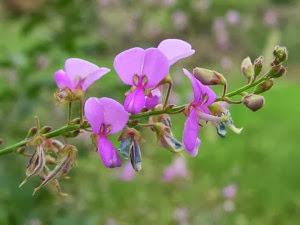Mark Bower sent us this picture of a tiny flower from the forest floor. Barb thought it was a Desmodium and Mark got the same opinion from the Missouri Native Plant Society Facebook page but we sent it on to Linda Ellis. She confirmed this but didn't have enough to try to identify it as to which of the many species it is. They are pretty and dainty with a 1/4" flower now but just wait a month.
September is the time that they start to spread the seeds. I know that all plants have their place, I just wish
that my pant leg wasn't one of them. Desmodium is also called tick trefoil, beggar's lice, stick
tights, hitch hikers, and occasionally"@*%^$#". There are 19 species
in Missouri which can only be identified by getting close enough for
their seeds to grab your clothes.
Their
seedpods grow in strings that break off individually to increase the
challenge of picking them off. They act as triangular magnets attracted
to cloth and hair, grabbing on with their tiny dense hairs. They look
and feel smooth except under magnification or my wife's watchful gaze
when I return home. Some can be scraped off with the back of a knife, others require individual picking. They even sealed Smokey's eyes shut after a walk.

 |
| Desmodium 9, Smokey 0 - REK |

When I scrape a cluster of seed off my legs, I try to tell myself that they
are a great native plant. They serve as a food source for deer and birds Lots of insects such as weevils, beetles, leaf eating larvae and aphids eat them, many of which are then eaten by quail. Best yet, they are the host plant for caterpillars of the Eastern Tailed Blue,
Everes comyntas, and the Gray Hairstreak,
Strymon melinus. OK, I guess the trade off for a picture like Jon Rapp's below is worth a little scraping of my pant legs.
 |
| Eastern Tailed Blues - Jon Rapp |
==============
Our favorite plant resources:
MONPS - Missouri Native Plant Society Facebook page can frequently identify a species.
Missouriplants.com lets you search by color and leaf arrangement.
http://www.illinoiswildflowers.info/ has encyclopedic information on our native species. The quickest way is to Google Illinois Wildflowers and the
species name.







